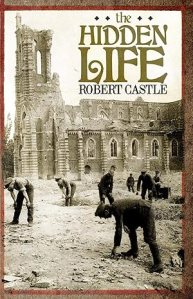Synopsis:
The police have just surrounded the hereditary mansion of Gladwynne Biddleton. He has just shot and wounded his security chief, Dominic Kittredge, and killed Dominic’s wife, Theresa. As he watches the siege unfold on TV, historical visions besiege Gladwynne’s mind. By turns he is a B-17 bombardier; an SS officer tasked with burning the bodies of Adolf Hitler and Eva Braun; a fugitive pursued by the celebrated Nazi hunter, Simon Wiesenthal; and a co-conspirator in the assassination of Austrian Archduke Franz Ferdinand and his wife, Sophie, Duchess of Hohenberg.
Between the television coverage and the pageant in his head, Gladwynne becomes dissociated from what has just actually happened. Fixation on his immediate physical needs and with life in the mansion tend to conceal the enormity of his crime from him. He descends into a narrowing and harrowing spiral of isolation.
Why did he shoot his closest confidant, Dominic? We don’t quite know. But in Dominic’s thirty year diary of serving Gladwynne we begin to find clues. In this chronicle, Dominic recounts the “golden age” of their association, a time when the two men devised a mock nation with Gladwynne as its center. With Dominic’s encouragement, Gladwynne came gradually to conceive of his own physical person as a sovereign state, competing diplomatically with other world states, persistently resisting their efforts to deprive him of his sovereignty. Between the hostile international powers out to get him and the police now at his door, will Gladwynne’s confusion become total?
Favorite Lines:
“Why bug him? Why not let him alone to pursue what he wanted? Namely, let him READ”
“We labored and bled and often humiliated ourselves for the favor of indifferent masters. I would be no different and, simultaneously, completely different.”
My Opinion:
I received a copy of this book from the author in exchange for my honest opinion.
Robert Castle’s The Hidden Life is a layered, unsettling novel that fuses courtroom drama, family saga, and psychological study into a narrative that constantly blurs the line between fact and delusion. At its center is Tony (Gladwynne Biddleton IV), a wealthy recluse who retreats into his own sovereign “state” of paranoia, books, and war games—until reality collides with his obsessions in a violent and public way.
The novel begins almost cinematically, with Tony in the cockpit of a bomber, struggling to release his payload—a surreal yet fitting metaphor for the tension between his immense privilege and his inability to act decisively in the world. From there, Castle builds a portrait of a man trapped in the shadow of an old-money dynasty, defined as much by wealth as by decay and scandal. The Biddleton family history, interspersed through news reports and testimony, reads like an American gothic—money, influence, and corruption stitched together with a thread of impunity.
Yet Castle never lets this become just a social critique. At its heart, the novel is about Tony himself, a man both grotesque and oddly sympathetic. His enormous head, described in disturbing detail, sets him apart from childhood, but it’s his obsessive reading, note-taking, and self-imposed isolation that give him dimension. He isn’t simply “the strange kid” who became a killer; he’s someone who tried to find order in chaos through books, chess, and rituals, only to have those coping mechanisms twist into delusions of grandeur.
One of the novel’s strongest features is its structure. Castle moves between Tony’s interior monologues, television commentary, historical flashbacks, and courtroom testimony. This mosaic approach allows the reader to experience the siege at Wolf Chase from multiple angles: Tony as besieged sovereign, the police as hesitant aggressors, and the public as hungry spectators. The testimonies of Bernard Thierry and Dominic Kitteridge—loyal family lawyer and loyal family servant—are especially sharp, exposing the ways in which devotion and dependency warp when tied to immense power.
The Hidden Life is not a straightforward read. At times it feels disorienting, intentionally so—echoing Tony’s fractured sense of reality. But that’s what makes it effective. Castle asks us to consider uncomfortable questions: How much of identity is inherited versus chosen? What do loyalty and servitude look like in the shadow of power? And perhaps most chillingly—when a person hides from the world long enough, do they become hidden even from themselves?
Summary:
Overall, Robert Castle’s The Hidden Life is a dark, ambitious novel that intertwines wealth, madness, and loyalty into a portrait of a man unraveling. Both unsettling and absorbing, it’s a story that lingers long after the final page, not just for what it says about one family, but for what it suggests about the hidden lives we all construct. Happy reading!
